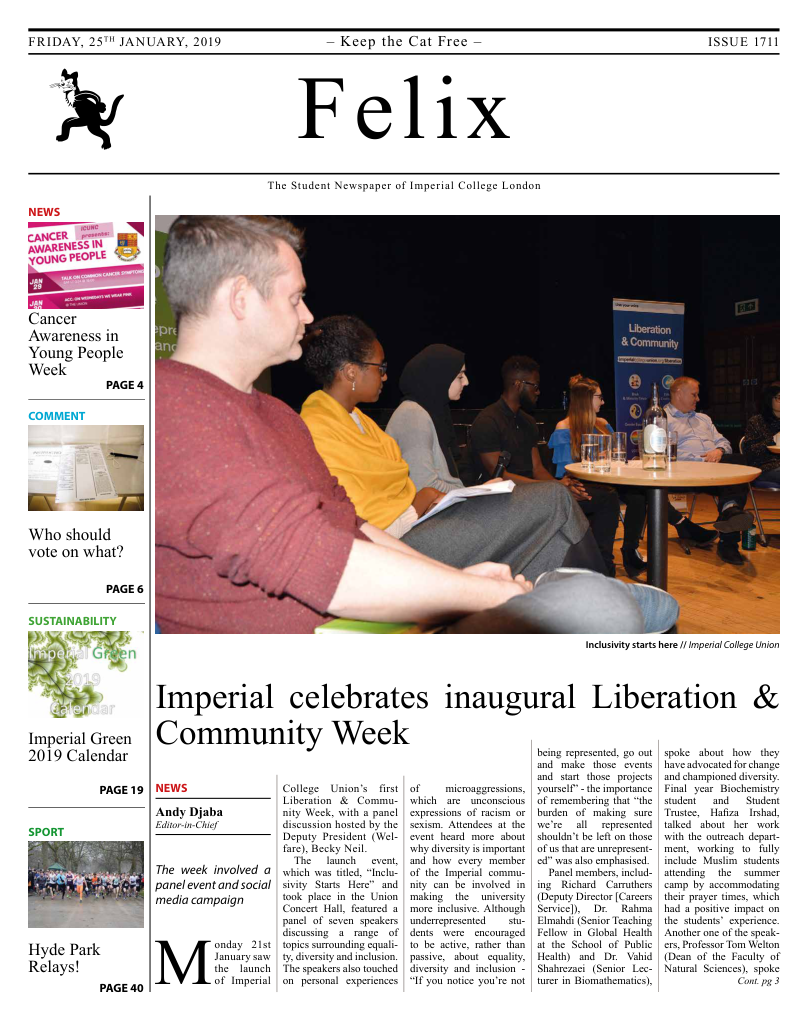Who should vote on what?
Comment editor Charles Titmuss argues that voters are not to blame for poor political outcomes

The Brexit vote has been in the zeitgeist for the past month as everything comes to a head. I humbly ask the reader to cast their minds back to that rosy day on the 23rd of June when the nation voted inconclusively for something to do with Europe. Although much attention has been paid to the way the nation voted and who voted for what, we are still questioning who exactly we should blame/ congratulate for this political outcome.
Winston Churchill once said “the best argument against democracy is a five-minute conversation with the average voter.” Although we shouldn’t necessarily listen to the words of a saviour-of-the-nation-cum-genocidal-white-supremacist, these words feel particularly relevant today. In the present day we are bombarded by a constant stream of commercial and political propaganda, that we accept or reject based on our internal biases. The merging of truth and opinion into a horrific parody of reality is something that we encounter on a daily basis. This is particularly dangerous in a political system that relies on fact and truth as the fundamental political currency. One concept bandied around by Imperial’s most obnoxious is qualified voting.
Qualified voting is the concept that people should only be granted the vote if they satisfy certain requirements. Previous forms of qualified voting have been used deny people sufferage on the grounds of racial, social or sexual inferiority or that those without property had no investment in the nation and therefore no right to run it. In the modern day, qualified voting exists solely in the form of an age and citizenship metric. One must be over 18 to exercise the right to vote in the UK. This is justified based on the claim that anyone below the age of 18 lacks the mental capacity to comprehend the complex issues of the day, despite the fact that the implications of political decisions taken may have far more ramifications for them than someone older.
This raises the question, if intellectual maturity is apparently of most concern, should we restrict the right to vote based on intellectual capability? Although I have heard this question answered in the affirmative by many of the particularly insufferable mouth-breathers around campus I do not believe that this is an appropriate answer. For one thing there is the challenge of where exactly to politically amputate the un-enlightened, and for the other, there is the question of morality. Discriminating based on intellectual achievement represents a frightening extreme of meritocracy. Just because someone lacks intelligence does not mean that they are not impacted by decisions taken on their behalf. They deserve the right to vote for that reason alone.
However, although I believe everyone has the right to express an opinion I do not necessarily believe that all opinions are created equal. Several disingenuous politicians, such as David Davis, have been pedalling the idea that everyone is an expert. This appeals to the individualist cult that we all happen to belong to nowadays, but in reality most opinions matter about as much as a whelk in a supernova. With the media cycle being a few hours at best, different highly complex issues are birthed, discussed and then die so rapidly, there is simply not enough time for individual voters to formulate a meaningful overview of the entire system. Therefore, there must be a reasonable solution that prevents misinformation and the misinformed from unduly impacting democracy without restricting voting access.
I would argue that the best solution to the problem presented is to restrict what people vote for. Instead of the broad in/ out question that was posed to the electorate with Brexit, it makes far more sense to limit voter options similarly to the process of voting for a party in representative democracy. The options of mad, bad, sad, crazy, racist, commie, Scottie and Irish allow the voter to select a horse and bet on it. This is in direct opposition to a blind, undefined leap in the dark, as was allowed to occur in the EU in/out referendum. Ambiguity was built into the question as Remain assumed they would win, and therefore would never need to answer the question whilst Leave required the question to be as simple as possible to unite the different Brexit factions to stand a chance of winning. This has led us to the point where an unsatisfactory deal has been negotiated by an unpopular Prime Minister. Only time will tell if we crash out of the single market not wearing a safety harness.
To return to the point of this article, clearly defined objectives are a must in any life undertaking. Instead of debating an in/out question, it should have been carried out in a similar manner to a general election, with multiple campaigns proposing differing options for the future relationship with the EU. Defined objective referenda have been shown to provide a satisfactory outcome in many legal independence campaigns (sorry Catalonia) as well as for isolated issues, such as gay marriage in Australia and abortion rights in Ireland. Applying referenda to an obscure and complex issue such as the extent of our membership with the EU was inappropriate and has only served to provide a confirmation of our lack of certainty of what our relationship with the continent is supposed to be. No referendum at all would have been better.





